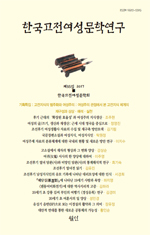- 영문명
- Exclusive Group Narrative of the In-group Toward Outsiders and Exploring the New Direction : Focusing on the Stepmother Folktale The Power of Beans Rice
- 발행기관
- 한국고전여성문학회
- 저자명
- 나지영(Jiyoung Na)
- 간행물 정보
- 『한국고전여성문학연구』제50권, 5~33쪽, 전체 29쪽
- 주제분류
- 인문학 > 문학
- 파일형태
- 발행일자
- 2025.06.30

국문 초록
지금까지 대다수의 계모설화는 외부자를 향해 배타적 태도를 보이는 것을 당연하고 자연스럽게 받아들였다. 나쁜 계모가 처벌받는 이야기가 압도적으로 많은 것은 ‘외부자를 향한 내집단의 배타적 집단서사’가 우리 사회에 막강한 영향력을 행사하는 주류의 서사임을 방증하는 것이다. 이 글에서는 나쁜 계모가 처벌받지 않고 기존의 내집단과 화합할 수 있다는 비주류의 서사 논리가 만들어지기 위해 필요한 요소를 탐색하고자 한다. 그것은 외부자를 향한 내집단의 배타적 집단서사가 보다 건강한 방향으로 확장될 수 있는 새로운 가능성을 탐색하는 일이기도 하다.
이를 위해 먼저 2장에서는 ‘나쁜 계모가 처벌받지 않는 비주류의 이야기’가 ‘나쁜 계모가 처벌받는 주류의 이야기’와 결정적으로 달라지는 주요 분기점을 중심으로 내집단 구성원의 역할에서 나타나는 특징들을 살펴보았다. 먼저 전처 자식은 대다수 계모 설화 속 전처 자식처럼 나약하고 무기력하기만 해서는 안된다. 결정적 순간에는 자기 목소리를 낼 줄도 알아야 하고, 계모가 낳은 자식들도 내집단의 구성원이라는 점을 인정할 수 있어야 한다. 아버지 또한 자녀에 대한 관심을 가지고 먼저 살필 줄 알아야 하고, 계모를 언제든 내칠 수 있는 존재가 아니라 어떻게든 함께 살아가야 하는 존재로 인식할 수 있어야 한다.
다음으로 3장에서는 북한 설화 <콩밥 먹은 힘>을 통해 나쁜 계모가 내집단과 화합할 수 있는 서사의 논리가 만들어지기 위해 필요한 요소를 보다 구체적으로 탐색해 보았다. 첫째, 아버지를 각성시키는 자녀가 등장해야 한다. 자녀는 자신의 어려움을 호소할 수 있는 용기가 있어야 한다. 둘째, 아버지는 자녀의 참여를 통해 완성되는 신뢰 기반의 맞춤형 해결책을 제시하였다. 자녀를 수동적 약자가 아닌 능동적 참여자로 전환시킨다. 셋째, 씨름판은 약자의 인정 욕구를 충족하는 한편, 관계 지속을 위한 상호 원망의 장이 되었다. 연극무대처럼 구성한 씨름판은 일종의 시뮬레이션 장치가 되어 아버지와 전처 자식이 계모의 잘못을 탓하며 원망할 수 있게 해주고, 동시에 계모와 계모 자식이 가지고 있던 원망을 표출할 수 있는 기회를 제공하였다. 계모가 가지고 있는 원망은 내집단 구성원의 원망보다 훨씬 더 구조적이고 근원적인 문제와 연결되어 있다. 계모가 되기 이전 삶이 제거된 채, 출발 지점에서부터 언제든 쫓겨날 수 있는 공동체의 최약자라는 문제 말이다. 씨름판은 계모의 원천적 불안감을 제거해 주면서 나쁜 계모가 처벌받지 않고 내집단과 화합하여 온전한 새로운 가정을 이룰 수 있는 새로운 길을 제시해 준 것이다.
영문 초록
In this study, the direction of healthy collective narratives needed in our society through stepmother folktales is explored. Most stepmother folktales don't give the bad stepmother a chance. Hostility and exclusivity toward outsiders who are incorporated into the in-group are natural and even considered right, a group narrative that is connected to the majority. There are some less mainstream stories where the bad stepmother is not punished. The question that this article primarily explores is when it is possible for a bad stepmother to reconcile with her existing in-group without being punished.
In Chapter 2, the characteristics that appear in the roles of in-group members, focusing on the major turning points where the ‘non-mainstream story of a bad stepmother not being punished’ differs decisively from the ‘mainstream story of a bad stepmother being punished’ are explored. The son of an ex-wife should not be weak and helpless like the sons of ex-wives in most stepmother tales. At critical moments, they must learn to speak up for themselves and recognize that their stepmother's children are also members of their in-group. Fathers, too, should not be as irresponsible as the fathers in most stepmother folktales. They need to know how to care for their children first, and see their new wife not as someone you can kick out at any time, but as someone you have to live with no matter what.
In Chapter 3, the North Korean folktale The Power of Beans Rice, which more fully embodies the non-mainstream story of a bad stepmother not being punished is examined. Through this, more specifically the elements necessary to create a narrative logic that allows a bad stepmother to reconcile with her in-group are explored. First, a child who awakens his father must appear. The child must have the courage to appeal to his difficulties. Second, fathers must be able to offer trust-based, customized solutions that are completed through their children’s participation. In the North Korean folktale, the father organizes a wrestling match to transform his children from passive underdogs into active participants. Third, the wrestling match served to satisfy the weak's desire for recognition, while also becoming a place for mutual resentment to sustain relationships. The wrestling match, which was set up like a theatrical stage, served as a kind of simulation device, allowing the father and his ex-wife's children to blame and resent the stepmother, while at the same time providing an opportunity for the stepmother and her children to express the resentment they had. Stepmother folktales always begin from the perspective of the in-group. So, in the process of transmitting the stepmother folktale, only the children from the previous marriage are the objects of warm concern and sympathy. The resentment that the stepmother harbors is connected to much more structural and fundamental problems than the resentment of the in-group members. The problem is that she is the weakest member of the community, and can be kicked out at any time from the starting point, with her life before becoming a stepmother eliminated. The wrestling match eliminated the stepmother's original anxiety and presented a new way for the bad stepmother to go unpunished and reconcile with her in-group to form a new, complete family.
목차
1. 서론
2. 계모 설화 속 내집단 구성원 역할의 중요성
3. 계모 설화 속 배타적 집단서사의 새로운 방향성
4. 결론
해당간행물 수록 논문
참고문헌
최근 이용한 논문
교보eBook 첫 방문을 환영 합니다!

신규가입 혜택 지급이 완료 되었습니다.
바로 사용 가능한 교보e캐시 1,000원 (유효기간 7일)
지금 바로 교보eBook의 다양한 콘텐츠를 이용해 보세요!


